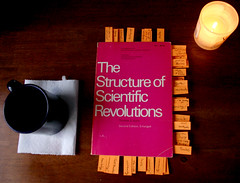Thinking about theories of historiography
By Kristopher A. Nelson
in
November 2010
700 words / 3 min.
Tweet
Share
Recently, I’ve been struck by the sense that what seems to drive history as a profession is not specifically the investigation of new archives, new materials, new places, or new times, but rather simply the larger desire to always pursue what is new qua new.
Please note that this post is from 2010. Evaluate with care and in light of later events.
 Recently, I’ve been struck by the sense that what seems to drive history as a profession is not specifically the investigation of new archives, new materials, new places, or new times, but rather simply the larger desire to always pursue what is new qua new. Attracting attention in the field seems to come not from revealing new aspects of the past, but from new methods investigation or explanation.
Recently, I’ve been struck by the sense that what seems to drive history as a profession is not specifically the investigation of new archives, new materials, new places, or new times, but rather simply the larger desire to always pursue what is new qua new. Attracting attention in the field seems to come not from revealing new aspects of the past, but from new methods investigation or explanation.
Put in old-fashioned science studies terms (i.e., Thomas Kuhn), cutting-edge history is obsessed with forever escaping the bane of “normal science“–that is, of applying useful and existing theoretical frameworks to look at the past–and instead forever seeks to a Kuhnian “paradigm shift.” From Marxist history to social history to the “cultural turn,” modernist to structuralist to postmodernist, there is a fascination with the new.
Interestingly, though, this is a “newness” that is grounded in the earlier approaches and reacts directly to them. Thus, “women’s history” rejected the dominant vision of traditional (and male-dominated) history, then became to “gender history,” which then led to a further reaction: “the history of masculinity” (Wickberg). Why? Because, it seems to me, the previous approaches became ho-hum “normal history,” and historians wanted to do something new: “The fields of women’s history, African-American history, and gay history have not disappeared. Instead they have become establishment, rather than oppositional, fields, arenas in which ‘normal history’ is practiced” (Wickberg).
This is the framework through which I see (to mix metaphors) Geoff Ely’s A Crooked Line: From Cultural History to the History of Society (and the critiques of it). Ely, in a sense, is tired of this hunt for the forever new, and proposes a kind of detente, which, essentially, draws a line in historiography and says, “Here we are–everything up to this point is what we should stick to, and get back to doing stuff.” He doesn’t seek to reject the “cultural turn” or Marxist history or anything else, but simply to focus back on “normal history.”
I am in many respects deeply sympathetic to this (much simplified) version of Geoff Eley’s position in A Crooked Line. I view theoretical approaches as useful tools, helpful when they are useful, and distracting when they are not. But at the same time, new theoretical approaches can reveal new truths about our past (and present and future). A “history of whiteness,” while in some sense an attempt to simply do something new in reaction to what has become “establishment history,” nonetheless also wrings something new out of our past that previous approaches might have missed. The past is a multilayered thing. Every shift in theoretical framework, whatever its motivation, peels back another layer. New interrogations of old things is no different from new interrogations of new things.
The fight about theory, its utility, reactions against it, fights about which is better, etc., etc., says more to me about the state of historians than it does about history at all. Theory, and theoretical discourse, is about the people who practice history, not about those we study. We fear the impression of disarray that theoretical arguments can convey to the world at large–if we cannot even agree about how to do history, how can we expect anyone to trust what we say? But, realistically, these arguments are no more specific to history (or other humanities or social sciences) than they are to any other discipline; despite this, our fears of distrust by non-historians are no less realistic. We envy the high status of science in our society, but climate scientists and vaccine researchers have all felt the sting of distrust when their internal theoretical dissensions become visible to outsiders. We should not fear theory, but we should be wary of it.
Related articles
- Considering comparative approaches in legal histories (inpropriapersona.com)
- On Wikipedia, Cultural Patrimony, and Historiography | booktwo.org (booktwo.org)
- History, historiography and Wikipedia (simoncollister.com)
